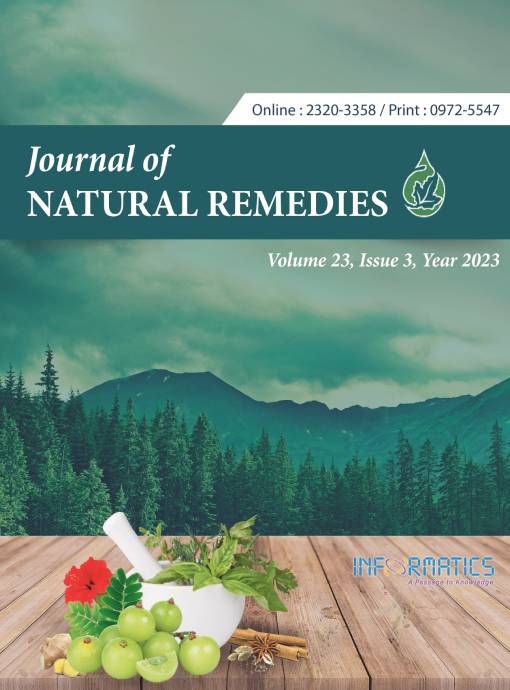A Case Study of Suttigai (Thermal Cauterization) in the Management of Mugavatham (Bell’s Palsy)
DOI:
https://doi.org/10.18311/jnr/2023/32444Keywords:
Copper Probe, Mugavatham, Suttigai, Siddha System, Thermal CauterizationAbstract
Bell’s palsy (Mugavatham) is a unilateral lower motor neuron facial paralysis of acute onset. Suttigai (Thermal cauterization) provides prompt relief. This study aims to establish the efficacy of Suttigai therapy in the management of Mugavatham. A 35-year-old male patient diagnosed with right-sided facial paralysis was treated with Suttigai therapy. The “House and Breckmann” assessment scale was used to evaluate the case. After the Suttigai therapy, the scale rating improved from grade IV to grade I. The asymmetry of the face and the motor functions significantly improved as a result. The efficacy of Suttigai treatment for the management of Mugavatham is successful with immediate relief. Hence more and more efforts are needed to optimize the treatment and utilization of Suttigai therapy in the management of Mugavatham.
Downloads
Metrics
Downloads
Published
How to Cite
Issue
Section
License
Copyright (c) 2022 R. Keerthika, D. Periyasami, M. V. Mahadevan, V. Mahalakshmi, P. Samundeswari, N. J. Muthukumar (Author)

This work is licensed under a Creative Commons Attribution 4.0 International License.
Accepted 2023-05-02
Published 2023-07-03
References
Eviston TJ, Croxson GR, Kennedy PG, Hadlock T, Krishnan AV. Bell’s palsy: aetiology, clinical features and multidisciplinary care. J Neurol Neurosurg Psychiatry. 2015; 86(12):1356-61. Epub 2015 Apr 9. PMID: 25857657. https://doi.org/10.1136/jnnp-2014-309563 DOI: https://doi.org/10.1136/jnnp-2014-309563
Zhang W, Xu L, Luo T, Wu F, Zhao B, Li X. The aetiology of Bell’s palsy: A review. Journal of Neurology. 2020; 267(7):1896-905. https://doi.org/10.1007/s00415-019-09282-4 DOI: https://doi.org/10.1007/s00415-019-09282-4
Ronthal M. Bell’s palsy: pathogenesis, clinical features, and diagnosis in adults. www.uptodate.com/contents/ bells-palsy-pathogenesis-clinical-features-and-diagnosis-in-adults? (last accessed on 22 March 2019) [Google Scholar] [Ref list].
Flifel, Mohamed E, et al. “Bell’s palsy: clinical and neurophysiologic predictors of recovery”. The Egyptian Journal of Neurology, Psychiatry and Neurosurgery. 2020; 56:1-5. https://doi.org/10.1186/s41983-020-00171-6 DOI: https://doi.org/10.1186/s41983-020-00171-6
Zhao H, Zhang X, Tang YD, Zhu J, Wang XH, Li ST. Bell’s Palsy: Clinical Analysis of 372 Cases and Review of Related Literature. Eur Neurol. 2017; 77(3-4):168-172. [PubMed] https://doi.org/10.1159/000455073 DOI: https://doi.org/10.1159/000455073
Holland, Julian N, Jonathan M Bernstein. “Bell’s palsy.” BMJ clinical evidence. 2014; 1204.
Kuppusamy Mudaliar KN, Siddha Maruthuvam (Pothu). 1st ed. Chennai; Directorate of Indian Medicine and Homoeopathy; 2004.
Thiyagarajan R, Gunapadam Thathu- Jeeva Vagupu. 1sted. Chennai; Directorate of Indian Medicine and Homoeopathy; 1952.
Uthayamarayan CS, Siddhar Aruvai Maruthuvam. 4th Ed, Chennai; Directorate of Indian Medicine and Homeopathy.
Ponnayapillai T, Pararasasegaram-Part 5, Srilanka; Virus Printers; 2016.
House JW, Brackmann DE. “Facial nerve grading system”. Otolaryngol Head Neck Surg. 1985; 93:146-147. https://doi.org/10.1177/019459988509300202 DOI: https://doi.org/10.1177/019459988509300202
Dhruvashree, Frank Sullivan. “Management of Bell’s palsy.” Australian Prescriber. 2017; 40(3):94-97. https://doi. org/10.18773/austprescr.2017.030 DOI: https://doi.org/10.18773/austprescr.2017.030

 R. Keerthika
R. Keerthika









 0.35
0.35 24
24 0.161
0.161